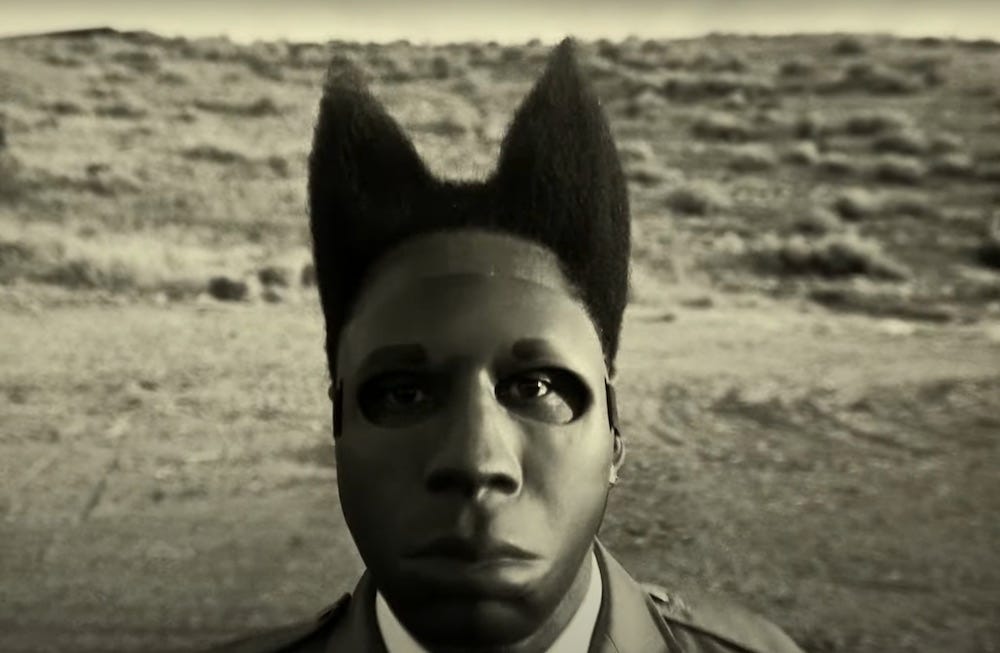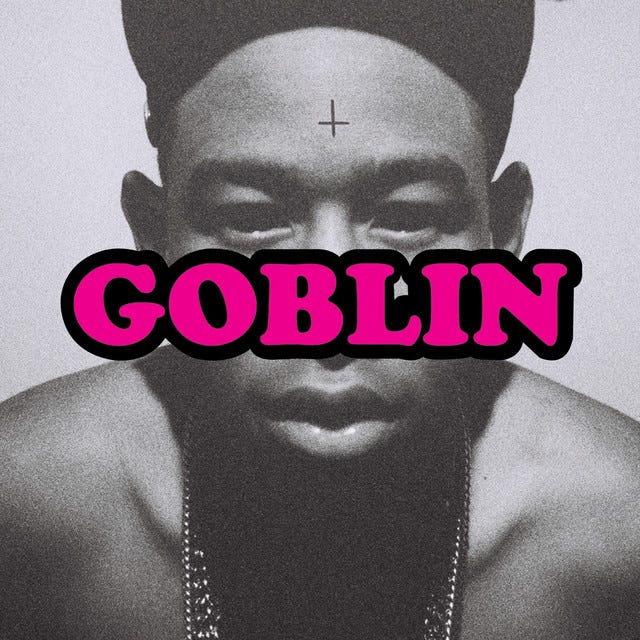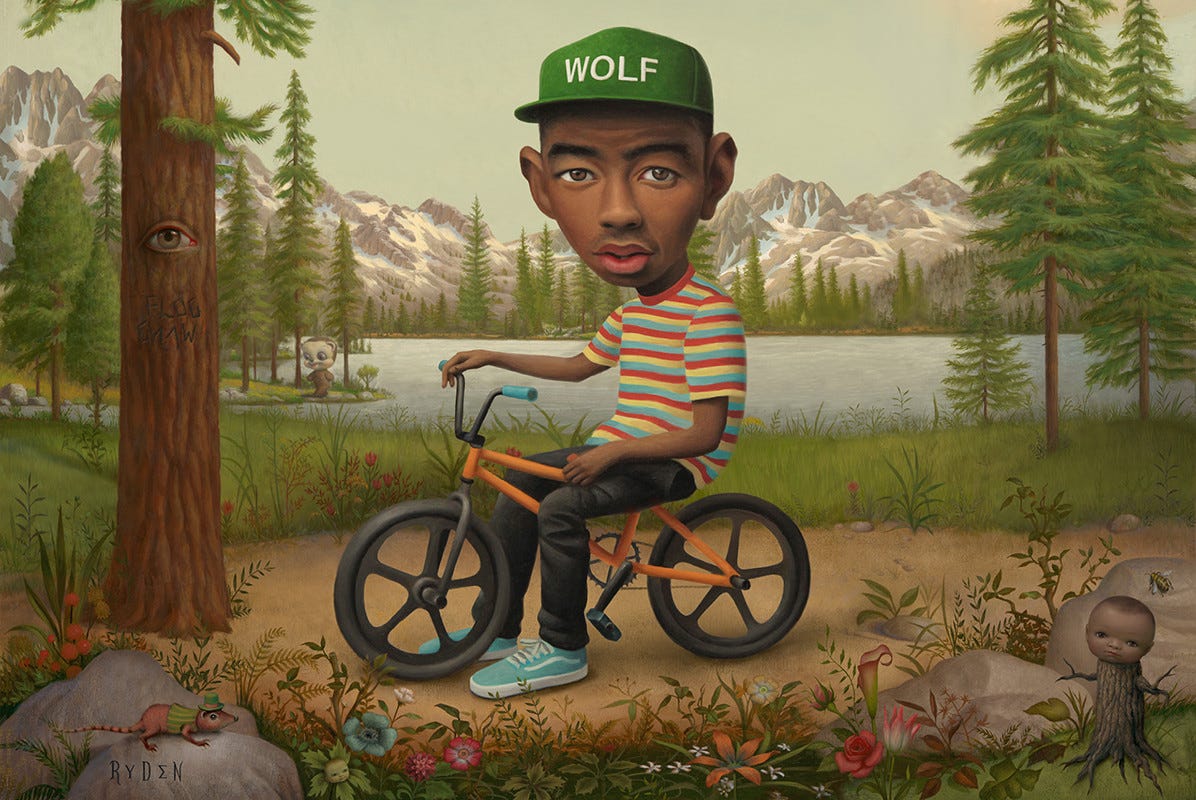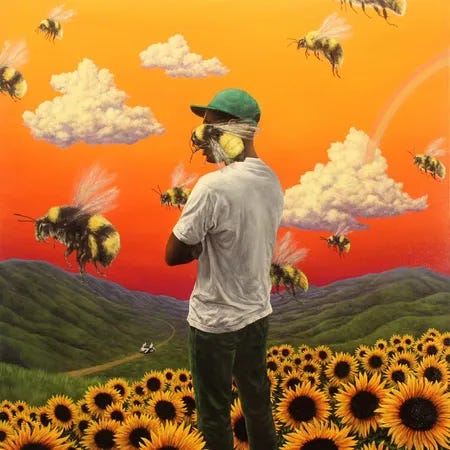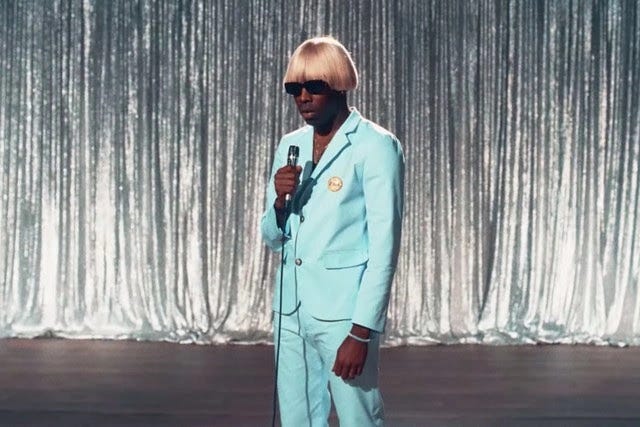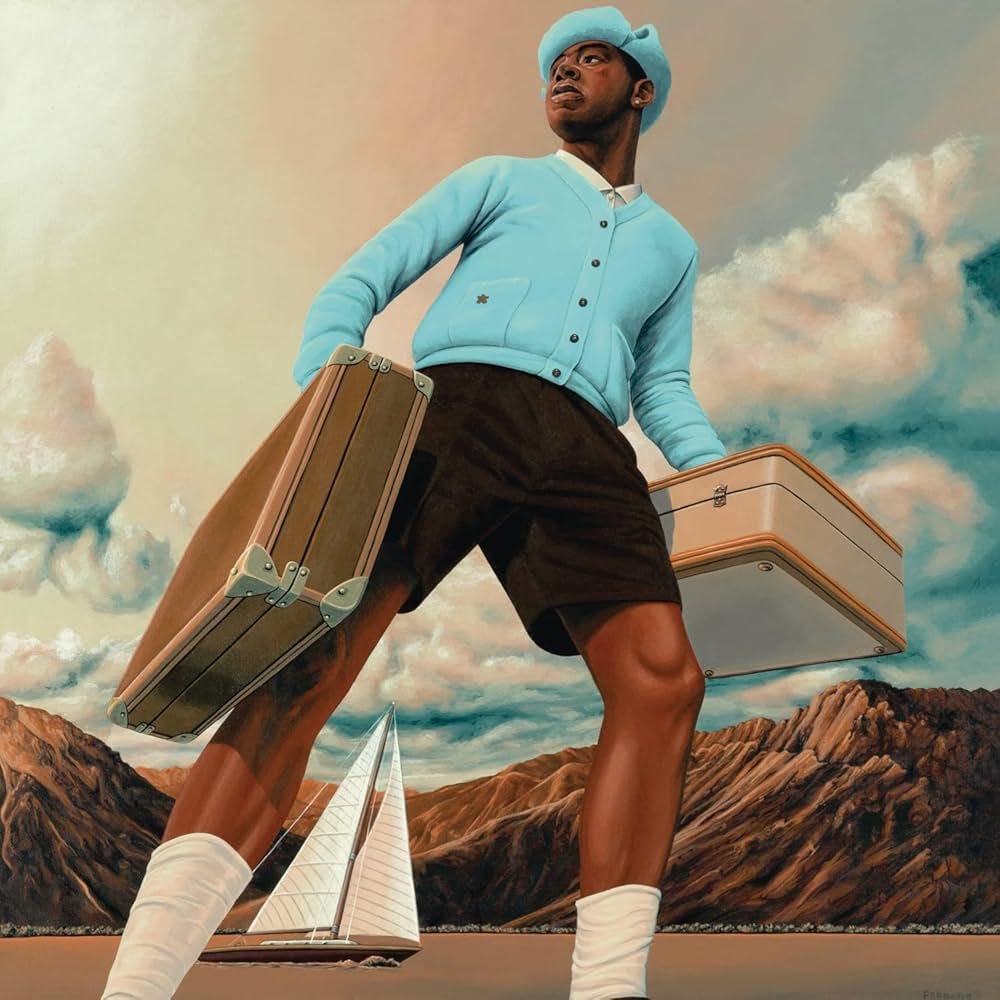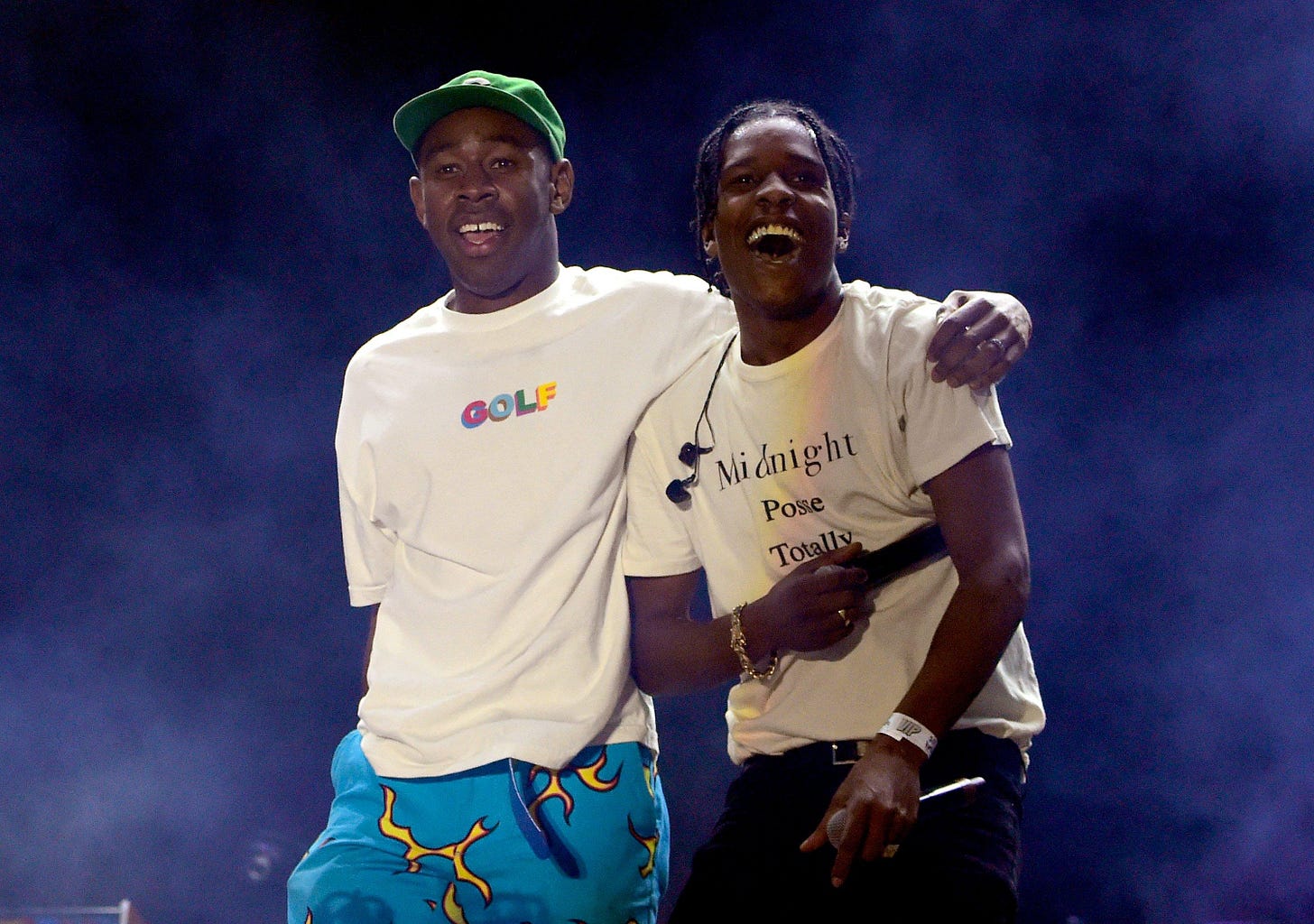We need to talk about Tyler, The Creator
Tyler, the Creator? Tyler, the genius.
👋 Hello! We’re The Z Link, a global Gen Z-led social media agency that helps brands connect with our generation. The Digital Native deconstructs the best campaigns in the Gen Z social media marketing world, so you can be the most informed marketing baddie in the office. For any feedback, questions or suggestions, just reply to this email!
Looking for a social media strategist? Book a free call with our team anytime. 😙
Move on from Brat summer; it’s time for Chromakopia fall. Tyler, The Creator’s just released a new album, so you know what time it is. Time for me to obsessively go through his entire discography, Pitchfork and Rolling Stone reviews and add a lil’ je ne sais quoi of my own to bring you a breakdown of his creative direction. I’m hoping someone from Rolling Stone is reading this… For no specific reason. But let’s talk about this visionary because it's true whether or not you agree.
The start
Tyler was part of a hip-hop collective called Odd Future Wolf Gang Kill Them All. This collective consisted of members such as Syd Tha Kyd and Frank Ocean, and their talents ranged from producers to filmmakers to clothing designers. This is when he self-released his first album, Bastard.
Now, the thing with Tyler is that he has a sound, but that sound is very different throughout his entire discography. The tones of voice change from album to album, thanks to his use of alter egos. The various tones of voice and alter egos contribute to his general creative direction, which I’ll obviously break down.
But to me, what sets Tyler apart is the fact that his discography is about self-improvement, and we witness it IN REAL TIME. His entire appeal is his relatability. In a review for Goblin, Pitchfork described him as being “online constantly” before chronically online was even a thing. He is an everyday guy, and he IS relatable despite the fame, and his iconic pulled-up tube socks (shoutout Weezer) contributed to that image.
Album deep dives (sort of)
Oooh, yes. Time for my favourite part of this issue: the actual analysis. Let’s start with Goblin. It’s Tyler’s second album, but it is the first studio album he released when he was only 19. The album is super conceptual and is a conversation between Dr. TC, Tyler’s psychiatrist, and Ace, Tyler’s violent and aggressive alter-ego that isn’t heard on future albums. This is the second conversation between Dr TC and Ace and takes place over 15 songs, covering topics like his estranged father, feelings of violence and his disgust at his rising fame and overarching themes like internal rage and abandonment issues. Tyler did find himself in hot water for his problematic lyrics about violence against women and homophobia (amongst others), but Tyler defended himself by saying he didn’t mean them. But this angsty and very teenage album aligns so well with the fact that it’s his sophomore album, and that’s the period when teenagers start to act out; I just think it’s nifty, but it doesn’t excuse the problematic lyrics. But where do you pin the blame, the alter-ego or Tyler?
Then we’ve got his third album, Wolf, which introduces us to Sam, Ace’s opposite. Sam tries to suppress Tyler’s emotions and is insecure and hostile. However, Wolf Haley, another persona introduced in this album, is confident and marks the onset of Tyler's confidence. As the album progresses, we see Tyler become one with Wolf Haley and shed his past self.
The Tyler, the Creator universe continues to expand, and with Cherry Bomb, we see what Pitchfork calls a kaleidoscope of all of Tyler’s selves. Following Cherry Bomb was Flower Boy, arguably Tyler’s most prominent album and the one that put him on the map. Flower Boy was Tyler’s way of mending things with the communities he had marginalised in the past through his lyrics. The lyrics are reflective and investigate how loneliness and isolation affected Tyler’s psyche. The audience sees him grow into the artist he’s always been as he encourages others to do the same while singing about finding someone who values you. He is unapologetically himself, not only as an artist but as a human.
With Tyler’s sixth studio album, Igor, we see another alter-ego called Igor. Igor follows the complex aftermaths that often follow after a breakup, and in Tyler’s case, it was a love triangle. Igor is loud and aggressive, with seemingly vicious ideas. The tone of voice is screeching, which is what you’d expect a person to sound like after a breakup; I know that from some very recent experiences, BUT WE BALL.
Continuing with alter-egos, Call Me If You Get Lost introduces Sir Tyler Baudelaire. This introduction is a nod to Tyler’s belief that he remains unapologetic in a world where artists are expected to adhere and follow. When asked about the title, he said, “And when I say Call Me If You Get Lost, I don’t mean when you don’t know what to do. I mean when you call me, I want you to be telling me the shit that you on, the shit that you doing, you out in the world getting lost doing your shit.” So, it’s really about stepping out of your comfort zone and your bubble and figuring it out with people who love you and are doing the same with their lives.
And now, the moment that you’ve waited for. Let’s talk about his latest album — Chromakopia. Another album and yet another alter-ego. This time, we’re let in on a conversation between Tyler, the Creator and Tyler Okonma. The entire album is about this conflict between him and the persona he has to portray to the world. Lyrics about his reality of being raised by a single mother might hint at this being one of his most personal albums yet. But more than that, it was about dropping his facade and further blurring the lines between Tyler, the Creator and Tyler Okonma.
Tyler’s social perception
If you haven’t figured it out already through his lyricism, Tyler is… slightly problematic. The media’s always seen him as this angsty and rebellious teen with a rough upbringing who is just lashing out through his music. But they sympathise and slowly change their opinions of him as his discography progresses.
Besides being known for being problematic, he’s also known for his many personalities—not alter egos, but they’re closely related. His personalities range from chill to quirky to hyped up, and his songs outline that, but so does his internet persona.
See, I personally love his friendship with A$AP Rocky and his relationship with Nardwuar. Now, if you don’t know Nardwuar, I implore you to look at his interviews. Tyler holds him in high regard, and I do think they bring out the best in each other. It’s these relationships that the media and the audience see, and they add another layer to his authenticity that people relate to even more.
Marketing and creative direction
Let’s talk about the ‘creator’ part in Tyler’s stage name. Outside of his music career, many of his marketing and creative direction decisions take place in the realm of fashion. The rapper has a longstanding relationship with Supreme and actually helped put the streetwear brand on the map. But besides that, it’s his own brands and styling that remain with people.
Golf Wang and Golf le Fleur are two brands established by Tyler that show his duality. Golf Wang is the more accessible line with a bright aesthetic and is mainly targeted towards skaters, while Gold le Fleur leans more towards luxury but retains the bright Tyler aesthetic.
Just like Tyler, Golf Wang’s start was riddled with controversies, but as the singer grew, professionally and personally, as did the brand. In an interview with Vogue in 2015, he said, “You gotta make what you know. I think that’s what a lot of lines lack. I put my personal life into my music, and I do it in my clothes, too.” In another interview with Hollywood Reporter, he said his clothes are for people going to Taco Bell or making shady deals they shouldn’t be.
Conclusion
Everything I just said shows that Tyler is really a creator. His passion is reflected in all aspects of his music and clothing lines. Everything he puts out is a piece of himself, and his art grows with him, making it relatable. Tyler’s always been a disruptive force since the beginning of his career and never backed down. Remaining faithful to yourself and your brand is the only way you can get success because it ensures you’re attracting the right audience. Authenticity ensures the focus is on building community; the numbers will follow. And this authenticity is what WILL set you apart.
There are three things you should take away from Tyler’s career: 1) Don’t be problematic, 2) Experiment, experiment, and experiment. It’ll be what expands you and your horizons, and 3) Come as you are.
Thanks for reading! Stay tuned for the next issue covering latest marketing campaigns and strategies winning over Gen Z. Any questions/suggestions as to what we should cover next? Reach out to us and we’re always here to chat!
— Brought to you by Shaurya, Trends Reporter at The Z Link



